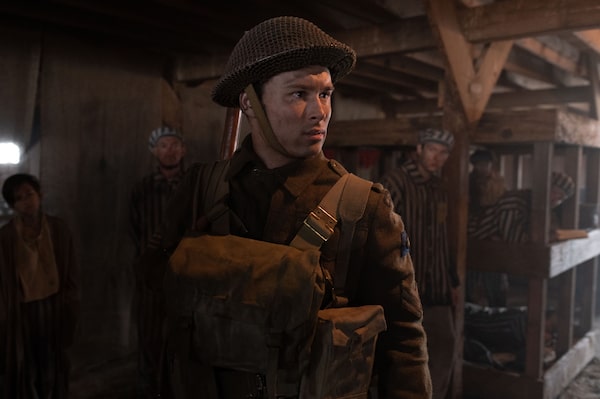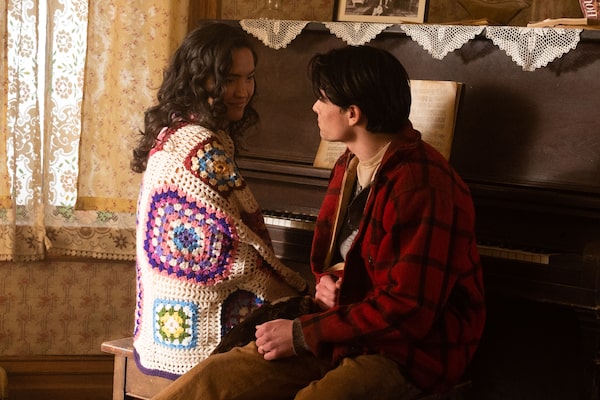Grace Dove as Aline Spears in the film Bones of Crows.Farah Nosh/Handout
From the beginning, Metis-Dene writer-director Marie Clements had planned to shoot parts of her new film, Bones of Crows, at the Kamloops Indian Residential School. She established a relationship with the community to provide support to cast and crew members who belonged to that region. A week before the shoot, however, it was announced that 215 suspected unmarked graves were discovered on the site.
“Obviously we’re a big machine, and as a production we’re thinking we’ll have to move and we better start on that right away,” Clements says in an interview. To her surprise, the organizers asked the team to continue with their plans. “They wanted the truth to be seen and heard.”
A sweeping epic spanning a century and multiple generations, Bones of Crows opens in theatres across the country this Friday. Through the story of Aline Spears (played by Summer Testawich, Grace Dove and Carla-Rae at different stages of her life), a Cree code talker in the Canadian military, the film highlights a painful chapter of our history long overlooked.
On set at the former B.C. residential school, which was in operation until 1969, there was grief and heaviness hanging in the air as the film crew started to shoot. Outside, the memorial for the children believed to be missing from records kept growing, as hundreds of people came to pay their respects.
“The blunt reality of it – that we’re working on a subject and we’re in the presence of it – it’s not in the past. It gave us a heightened consciousness,” Clements says. “We had to focus – for those families, for those babies that were found, and connecting our own families with that experience.
“It’s still kind of a blur because, I guess, it hurt. But it was also a profound reminder of how important our stories are. Because they’re still continuing. They’re still alive, and we’re still alive.”
Although many Indigenous filmmakers in Canada grow up with stories of their family’s experience with residential schools, their depiction in popular culture has just scratched the surface. And so, Clements envisioned a deeper interrogation, spanning from the time of first contact to the present day.
There are still people who remain grossly unaware of these stories, despite recurring news headlines, she says. It’s also a history that people from her parents’ generation don’t like to dwell upon.
“It wasn’t something they leaned into. There was a kind of feeling that they have survived, and there was a kind of privilege in that – to try and grab on to the future, and to try to just get over it, and be able to provide our generation with a better future,” she says. “So this kind of secret, even in our families, is hard to get to.”

The film is a sweeping epic that highlights a painful chapter of Canada's history long overlooked.Farah Nosh/Handout
A curiosity about the world around her and a desire to pursue the truth have driven Clements as a filmmaker. Her dramatic feature debut, Red Snow (2019), a war drama about an Indigenous soldier in the Canadian army fighting in Afghanistan who gets captured by the Taliban, was shot in the Northwest Territories among other Canadian locations. Her music documentary The Road Forward (2017) connects the beginnings of Indigenous nationalism in the 1930s to First Nations activism today.
“Frankly, there’s so many things that make me mad that it’s great fuel for stories,” she says, laughing. “What I hope to do with my work is that people would be able to have a different kind of dialogue after they witness something. Whether they agree with me, whether they hated what they saw – at least it’s a dialogue they might not have had before.”
Bones of Crows’ central character, Aline, was built partly from Clements’s observations of her mother and aunties, and the extraordinary ways they moved in the world. While the film’s research team benefited from records and documents that had previously been unavailable to Clements as a young person, she felt a need to reclaim accounts she’d heard on a personal and community level.
“People, families – they have their codes,” she says. “We witness, you know, our mothers and fathers, and their little ways of surviving. As you get older, you start to understand how they managed difficult situations. Or how they glossed over things. Every family’s codes are unique but we all have them.”
Review

Although it’s a difficult film to watch, Bones of Crows offers a perspective often missing from news stories.Derek Rodgers/Handout
- Bones of Crows
- Written and directed by Marie Clements
- Starring Grace Dove, Carla-Rae and Summer Testawich
- Classification N/A; 124 minutes
- Opens in theatres June 2
Critic’s Pick
“How good are you at keeping secrets?” a senior military officer asks Aline Spears, a Morse code operator with the Canadian army, while offering an opportunity to work with a secret division in the air force in 1942, writing and deciphering code in Cree.
“I have a lot of experience,” Spears replies, with a wistful smile.
Based on true events, Bones of Crows traces Spears’ story as a Cree girl taken from her family to a residential school, to a young woman serving in the Canadian military, to finally a matriarch testifying at the Vatican.
Although it’s a difficult film to watch, the loving way in which it depicts Indigenous families and their traditions, including a simple family dinner, offers a perspective often missing from news stories. The historical span from the late 1800s to present day also gives the film heft; the flashbacks used to reflect how memories carry intergenerational trauma are a poignant device. It’s a gift to watch the largely Indigenous cast bring to life a story that many of them have a personal connection to.
There are some quibbles, and the writing could be stronger in parts. However, it’s important to remember the film is based on stories told by the survivors. Hearing some of those testimonies at the end of the movie is especially moving. Bones of Crows offers a history lesson we cannot afford to forget.
 Aparita Bhandari
Aparita Bhandari